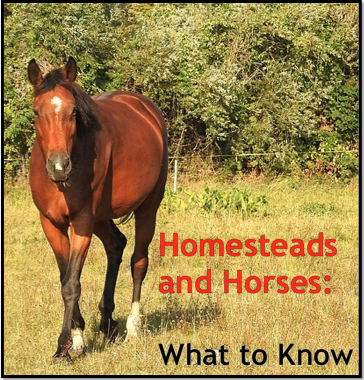Horses bring a variety of benefits to homesteads, whether by plowing fields or by providing compost for gardens or farmland. If you’re considering a horse for your homestead, there are a few factors to think about beforehand.
Their Daily Care
Like any animal, horses require daily care. Aside from hay and water, your horse may also need grain depending on their age and dietary needs. Their stall or shed will also need to be bedded throughout the year. While there are a variety of bedding options, straw and shavings tend to be the most common choices.
Your horses, or team, will also need daily grooming to prevent skin irritation from their tack or equipment. Grooming both before and after work is the best course against chafing, so consider using a series of brushes on your horse before work and then bathing your horse after work to remove any sweat or dirt. You’ll also need to keep your tack clean to prevent future rubbing or chafing.
As with any large animal, you’ll need a suitable shelter and fencing for your horse. Common shelters include barn stalls and run-in sheds. An added benefit of run-in sheds is that they can offer both shelter and access to a pasture or a dry lot.
There are a slew of fencing options for your horse’s pasture or dry lot. As an owner, you’ll want to take into consideration upkeep, as well as your horse’s breed. For example, you’ll need tougher fencing if you have draft horses, which are a common choice for farming.
Their Healthcare
While you can manage some of your horse’s healthcare, it’s important to have an equine veterinarian and a farrier.
Your veterinarian will likely visit twice a year for wellness exams, which include checking your horse’s teeth. Because horses’ teeth continually grow, their teeth often develop rough or jagged edges, which impact their ability to eat and can lead to weight loss. Since horses generally have their teeth filed or floated once a year, it’s important to have these wellness exams, even if your horse seems fine.
While some smaller livestock animals, such as goats or donkeys, are feasible to trim by yourself, find an experienced farrier to trim and/or shoe your horse. If you have a draft horse, you’ll have a limited selection of farriers, due to the breed’s size. Typically, your horse will be trimmed every six to eight weeks, based on their toe growth.
Choosing to shoe your horse is a decision best left to you and your farrier, as well as your horse. Shoes can be a remedy for lameness or excessive foot wear, which can result from fieldwork in certain climates or landscapes. Remember to update your veterinarian on any changes though, as lameness can be a sign of other health issues.
So, what can you manage? Parasites and vaccinations.
When it comes to parasites, prevention is the best way to manage the health of your horse. Though you can deworm your horse at the first sign of parasites, it’s recommended to maintain a preventative deworming schedule. For example, you could deworm your horse during each farrier visit. To find out which dewormers to use, talk to your veterinarian.
You’ll also want to speak to your veterinarian about vaccinations. Each year, your horse will need to be vaccinated for the following:
- Tetanus
- Rabies
- West Nile
- Eastern/Western equine encephalitis
Your veterinarian may recommend other vaccines based on your area and your horse. Your vet can also suggest a vaccination schedule, as some vaccines, such as for West Nile, can be given more frequently.
Vaccines can be purchased from a variety of suppliers. Typically, vaccines are administered subcutaneous or under the skin. Keep an eye on your horse afterwards to watch for any adverse reactions, such as swelling, lack of appetite or anaphylactic shock.
Their Training
While you can train your horse yourself, you also have the option to purchase a horse with farming and/or driving experience. Various techniques and tactics are used in training a horse for farming. A key component is communication and familiarity with your horse’s disposition.
If you are new to driving horses, you’ll need to be the trainee. Search for workshops or apprenticeships with local farmers who use horse power. Get a head start by researching and learning about farm equipment and tack used in horse-powered farming. Wait until you have sufficient experience, before purchasing a horse and/or team for farming.
Their Commitment
Like any animal, horses are a commitment. It’s important to weigh the amount of care and commitment a horse requires against their expected contributions to your homestead.
For example, consider the following:
- Your interest and knowledge of horses and driving.
- Your potential source of hay, bedding and feed.
- Your possible location for shelter and pasture.
- Your selection of equine veterinarians and farriers.
- Your available time and work commitments.
- Your current and estimated costs in adopting horse-powered farming.
Take the time to consider the above. Do the research. It’ll help you determine if horses are a good fit for your homestead — and that’s what you really need to know.
 Bobbi Peterson loves writing and regularly posts on her blog Living Life Green. She’s also a freelance writer, green living advocate and environmentalist. You can find more from Bobbi on Twitter.
Bobbi Peterson loves writing and regularly posts on her blog Living Life Green. She’s also a freelance writer, green living advocate and environmentalist. You can find more from Bobbi on Twitter.




